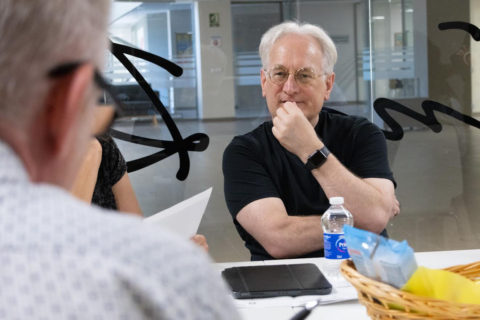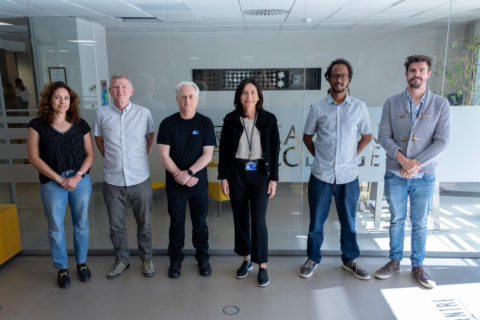
This University of Oxford PhD holder and leader of the Council of Europe’s expert group on Artificial Intelligence and education gave a conference at Caxton College’s 7th Forum for Innovation in Education.
How must schools confront this new technology in order to find ways to improve students’ learning? This British specialist, internationally known for his research into AI in education, said AI should be used ‘in moderation and from a critical and constructive perspective. AI is an impressive tool, as we know, but we have to use it critically, analysing it in detail, to understand what it can be used for and how to do it so that it benefits us’.
Dr Holmes believes that currently, AI programmes are using humans to do all of the work and that artificial intelligence is in control. In his opinion, this situation should be reversed. ‘We need for AI to be like a mythical centaur, for the head to be human and the body to be AI. This would put people in control of it’.
How is AI affecting education?
In recent years AI platforms have been developed for schools, all of which are very similar, to help students find their own learning path depending on the responses that they give to the questions that the programme asks them. ‘Personally, I don’t care for this kind of tool. However, there is one Chinese platform I like because the teacher and the student interact. And the way it works is that when a student doesn’t understand something in a lesson, they leave the classroom to connect to the AI app, type in the topic they are having trouble with and are put in touch with a teacher who can try to explain it in a personalised fashion’, said Dr Holmes. ‘This allows human interaction to continue, and most importantly, the teacher doesn’t lose control of what the students are learning’.
In the words of Dr Holmes, currently a professor at the prestigious University College London, these platforms—which initially seem to be beneficial—haven’t undergone sufficient testing to show that they are effective or that they have a positive impact on students’ learning. ‘Private companies that develop these AI tools avoid doing studies because they are afraid that they may show unexpected results. We need more studies to be done to know what is happening. We don’t really know the impact this is having on children’s development’, said Dr Holmes.
Nevertheless, he believes that students should use AI because it is undeniable that it can speed up certain processes, but they should use it ‘in a creative and useful way, exploring it with a mature and active attitude, without hiding behind it and letting it do all of their work. Students should use it critically’.

Demystifying AI
Dr Holmes announced, right at the start of his conference, that he would be breaking down some of the myths about AI based on the research he has done in classrooms for over a decade. He also alluded continually to the fact that the best tool for students and teachers is critical thinking. ‘For years, AI has been trying to develop systems to automate the work that teachers do in the classroom, but in my opinion, this is a mistake. This new technology should be a guide and provide tools that can help teachers do their jobs better. Instead, AI tries to replace teachers, such as in evaluating students, and I think this is very dangerous. It is not a transparent system because teachers don’t know exactly what AI is teaching students’, said Dr Holmes.
Timesaving
Another promise made by AI in education is that it saves teachers time. Dr Holmes was clear in this regard, saying, ‘What AI does in the classroom is that it shifts the time teachers spend on tasks: instead of spending time on one task, they spend time on another, but it doesn’t actually save them time’. In his opinion, AI also undermines the relationship between students and teachers. ‘When students work together they share ideas. But in classes with thirty computers, students look at the screens and ignore one another. They also don’t have a relationship with their teachers, because they’re immersed in their own personalised learning, which isn’t really personalised, because it’s based on standardised learning’.
Qualified teachers
According to Dr Holmes, when they use AI, teachers lose control of teaching and learning and can even become deskilled, since they can be reduced to turning computers on and off and ensuring students behave in the classroom. Bearing in mind that ‘there aren’t enough qualified teachers in the world’, this expert emphasises that the first thing we must do is identify the problems we have in education in order to look for the solutions using AI, and not the other way around, which is what we are currently doing. We have to concentrate on the causes and not the symptoms. ‘This is called technosolutionism’, said Dr Holmes.
